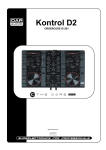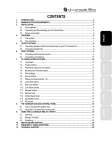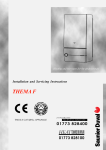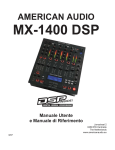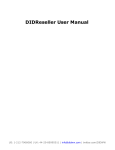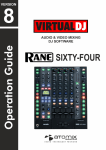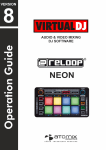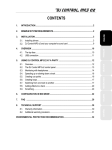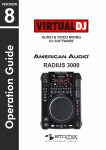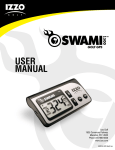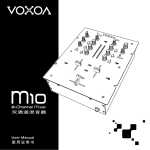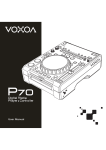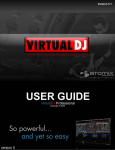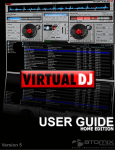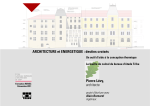Download User Manual - Lightsounds
Transcript
User Manual IMPORTANT SAFETY INSTRUCTIONS ENGLISH 1. 2. 3. 4. 5. 6. 7. 8. Read these instructions. Keep these instructions. Heed all warnings. Follow all instructions. Do not use the apparatus near water. Clean only with dry cloth. Do not block any ventilation openings. Install in accordance with the manufacturer’s instructions. Do not install near any heat sources such as radiators, heat registers, stoves, or other apparatus (including amplifiers) that produce heat. 9. Do not defeat the safety purpose of the polarized or grounding-type plug. A polarized plug has two blades with one wider than the other. A grounding-type plug has two blades and a third grounding prong. The wide blade or the third prong is provided for your safety. If the provided plug does not fit into your outlet, consult an electrician for replacement of the obsolete outlet. 10. Protect the power cord from being walked on or pinched particularly at plugs, convenience receptacles, and the point where they exit from the apparatus. 11. Only use attachments/ accessories specified by the manufacturer. 12. Use only with a cart, stand, tripod, bracket or table specified by the manufacturer, or sold with the apparatus. When a cart is used, use caution when moving the cart/apparatus combination to avoid injury from tip-over. 13. Unplug this apparatus during lighting storms or when unused for long periods of time. 14. Refer all servicing to qualified service personnel. Servicing is required when the apparatus has been damaged in any way, such as power-supply cord or plug is damaged, liquid has been spilled or objects have fallen into the apparatus, the apparatus has been exposed to rain or moisture, does not operate normally, or has been dropped. 15. When the mains plug or appliance coupler used as the disconnect device, it shall remain readily operable. 16. Please keep the unit in a good ventilation environment. WA RN I N G To reduce the risk of fire or electric shock, do not expose this apparatus to rain or moisture. The apparatus shall not be exposed to dripping or splashing and that no objects filled with liquids, such as vases, shall be placed on the apparatus. CAUTION : To reduce the risk of electric shock, do not remove any cover. No userserviceable parts inside. Refer servicing to qualified service personnel only. The lightning flash with arrowhead symbol within the equilateral triangle is intended to alert the use to the presence of un-insulated “dangerous voltage” within the product’s enclosure that may be of sufficient magnitude to constitute a risk of electric shock. The exclamation point within the equilateral triangle is intended to alert the user to the presence of important operation and maintenance (servicing) instructions in the literature accompanying this appliance. CAUTION 38 To prevent electric shock, do not use this polarized plug with an extension cord, receptacle or other outlet unless the blades can be fully inserted to prevent blade exposure. IMPORTANT SAFETY INSTRUCTIONS 17. All warnings on the appliance and in the operating instructions should be adhered to. 18. Heat - The appliance should be situated away from heat sources such as radiators, heat registers, stoves, or other appliances (including amplifiers) that produce heat. 19. Power Sources - This product should be operated only from the type of power source indicated on the rating label. If you are not sure of the type of power supply to your home, consult your product dealer or local power company. For products intended to operate from battery power, or other sources, refer the operating instructions. 21. Power-Cord Protection - Power-supply cords should be routed so that they are not likely to be walked on or pinched by items placed upon or against them, paying particular attention to the cord in correspondence of plugs, convenience receptacles, and the point where they exit from the appliance. 22. For AC line powered units - Before returning repaired unit to user, use an ohm-meter to measure from both AC plug blades to all exposed metallic parts. The resistance should be more than 100,000 ohms. ENGLISH 20. Grounding or Polarization - This product may be equipped with a polarized alternation-current line plug (a plug having one blade wider than the other). This plug will fit into the power outlet only one way. This is a safety feature. If you are unable to insert the plug fully into the outlet, try reversing the plug. If the plug should still fail to fit, contact your electrician to replace your obsolete outlet. Do not defeat the safety purpose of the polarized plug. 23. Non-use Periods - The power cord of the appliance should be unplugged from the outlet when left unused for a long period of time. 24. Object and Liquid Entry - Care should be taken so that objects do not fall and liquids are not spilled into the enclosure through openings. 25. Damage Requiring Service - The appliance should be serviced by qualified service personnel when: A. The power-supply cord or the plug has been damaged; or B. Objects have fallen, or liquid has been spilled into the appliance; or C. The appliance has been exposed to rain; or D. The appliance does not appear to operate normally or exhibits a marked change in performance; or E. The appliance has been dropped, or the enclosure damaged. 26. Servicing - The user should not attempt any service to the appliance beyond that that described in the operating instructions. All other servicing should be referred to qualified service personnel. 27. Lightning - For added protection for this product during a lightning storm, or when it is left unattended and unused for long periods of time, unplug it from the wall outlet and disconnect the antenna or cable system. This will prevent damage to the product due to lightning and power-line surges. 28. Replacement Parts - When replacement parts are required, be sure the service technician has used replacement parts specified by the manufacturer or have the same characteristics as the original part. Unauthorized substitutions may result in fire, electric shock, or other hazards. 29. Safety Check - Upon completion of any service or repairs to this product, ask the service technician to perform safety checks to determine that the product is in proper operating condition. 39 FEATURES and FUNCTIONS ENGLISH DJing Software Controller The M70 is a high performance digital mixer featuring an operational interface devoted the DJing software without having to connect an external controller. Allowing DJs directly access DJing software features without the need for an additional external controller. The controller functions included transport, files browsing, effects control, 8 samples,8 hot cues, manual and auto loop, and sample recorder. Moreover, for DJing software didn't support MIDI out function DJs can customize the LEDs as toggle mode or hold mode. Bundle with VirtualDJ LE The M70 bundles with VirtualDJ LE to provide DVS (Digital Vinyl System) function and supported MIDI mapping for Traktor Pro and Serato Scratch Live. It provided DJs an easy way to enjoy scratching through scratching DJing software. High Quality Sound and Build-in 2In/2Out Sound Card The M70 features an internal 2In/2Out (stereo) USB sound card that enables the DJs to connect directly to computer with a single USB cable. In order to provide DJs high quality sound the M70 employed a high quality digital/analog converter. High Performance Crossfader Crossfader plays a dramatic role for scratching DJs. The M70 is equipped with a high performance crossfader to provide DJs with the best possible feel. The crossfader has curve adjustment in order to satisfy different DJing style. Moreover, not only the crossfader has curve adjustment but also both of the channel faders have curve adjustment. The channel faders and crossfader have reverse switch. Build-in Filter Effect for Each Channel The M70 is equipped with Filter effect for each channel. DJs simply turn the Filter knob and filter effects can be adjusted enabling dynamic and intuitive song arranging. DVS Direct Mode The M70 can operate with DVS Direct Mode for DJing software by using vinyl or CD control time code signal. It perfectly integrates with traditional vinyl feeling and advanced software features. Moreover, under the DVS Directly Mode the external audio from CD players or turntables can implement effects provided by DJing software. 40 FEATURES and FUNCTIONS FEATURES ENGLISH • Integrated 16bit /48kHz USB Audio Interface (Soundcard) with 2in/2out (stereo) • High quality AD/DA Converters providing superb sound quality • Included low latency ASIO driver • DVS Direct Mode (CD or Vinyl) for DJ software using timecode signal • MIDI controller compatible with various DJing software • Fully MIDI control function for File Browsing, Transportation, Hot Cues, Samples, Loop control ,Effects control, Pitch control and special function (Loop recorder or Video transition) • A great diversity of Inputs – Simultaneously play a combination of digital and analog sources • Independent 3-Band Equalizer with fully kill function (-infinity dB to +10dB) • Manual Filter adjustable from LPF – HPF for each channel • Replaceable 45 mm High quality long life crossfader • Adjustable crossfader curve for different DJing style • Reversible crossfader and channel fader • Channel fader with independent adjustable curve and reverse switch • Fader Start play for cross fader and compatible with CD players • Dual 10 LED monitor display for master meters • Independent PFL meter for each channel • Mic input with auto talk over function and tone control • Headphone monitor can be switched to cue or master • 2 AUX inputs (3.5 mm and RCA) for MP3 player (ex.iPod) friendly 41 SOFTWARE INSTALLATION INSTRUCTION INSTALLING ASIO DRIVER FOR WINDOWS Before you can use the VOXOA M70, you need to install its ASIO driver first. The ASIO lower latency to under 10 ms. you can configure the driver's settings using the Control Panel window. This tool and its options are explained following: PC SYSTEM REQUIREMENTS (Minimum system requirements): - Intel Pentium II 450MHz CPU or comparable AMD CPU(recommend at least a Pentium III CPU with 600M MHz) . ENGLISH - Windows 98SE, ME, 2000, XP, Vista and Windows 7 operating system - 1 available USB port - At least 128MB RAM - Software applications with ASIO support INSTALLATION: Step 1: Place the installation CD in the CD-ROM drive of your computer and execute Setup.exe file. Step 2: Select the desired language and click “Ok” Step 5: In order to complete the installation it’s necessary to reboot the computer. Press [Reboot now], or press [Reboot later] if you don’t want to reboot your computer now. Step 3: Click “Install the driver” Step 4: Follow the instructions from the installation window and install the driver step by step. 42 SOFTWARE INSTALLATION INSTRUCTION INSTALLING VIRTUALDJ FOR WINDOWS PC SYSTEM REQUIREMENTS •Minimum system requirements: -Intel® Pentium® 4 or AMD Athlon™ XP -1024x768 resolution -DirectX compatible soundcard -512MB RAM -50MB free on the hard drive ENGLISH •RECOMENDED system requirements: -Intel® Core™ 2 or AMD Athlon™ X2 -1280x1024 resolution -Multi-channel DirectX compatible soundcard -1024MB RAM -200MB free on the hard drive •Additional requirements for video mixing: -2048MB (2GB) RAM -ATI™ or NVIDIA® video card w/256MB of Dedicated DDR3 RAM -Video card must support dual-screen output Step 5: Double click the VirtualDJ icon created on the desktop. And then follow the instructions on the to enter the product serial number. •Supported Operating System: -MINIMUM: Microsoft® Windows XP SP3 or newer -RECOMMENDED: Microsoft® W indows 7 Professional 32-bit -Microsoft® Windows 95, 98, ME, or older are not supported INSTALLATION: Use the following steps to install the DJ software “VirtualDJ” in the supplied CD-ROM. Step 1: Insert the included installer disc to your computer. Step 2: Double click “install_virtualdj_le.exe” to execute the installer Step 3: Follow each step in the installation screen for installation. Step 4: When the installation completes, click the “Finish” button to close the installation screen. NOTE : The serial number is printed on the back of the CD-ROM case. For information about how to use the DJ software, see the instruction manual for the DJ software or the help menu. VirtualDJ is an Atomix Productions software. To install and use the software, you have to accept the software license agreement. VOXOA Co. shall not be responsible for any problems with your computer and other software that may arise from the installation and use of VirtualDJ. 43 SOFTWARE INSTALLATION INSTRUCTION ENGLISH INSTALLING VIRTUALDJ FOR MAC OS MAC SYSTEM REQUIREMENTS INSTALLATION: •Minimum system requirements: -Intel® processor Step 1: Insert the included installer disc to your computer. Step 2:Double click “install_virtualdj_le.exe” to execute the installer Step 3:Follow each step in the installation screen for installation. Step 4: When the installation completes, click the “Close” button to close the installation screen. -Mac OS X v10.5.x -1024x768 resolution -CoreAudio compatible soundcard -1024MB RAM -50MB free on the hard drive •RECOMENDED system requirements: -Intel® processor -Mac OS X v10.6.x -1440x900 resolution -Multi-channel CoreAudio compatible soundcard -2048MB (2Gb) RAM -200MB free on the hard drive •Additional requirements for video mixing: -ATI™ or NVIDIA® video chipset w/256MB of Dedicated DDR3 RAM -Video must support dual-screen output •Supported Operating System and Processor Platforms: -MINIMUM: Mac OS X v10.5 Leapord on Intel processor platform -RECOMMENDED: Mac OS X v10.6.x Snow Leapord on Intel processor platform -Apple® Mac OS X 10.4.x Tiger or older are not supported -Motorola® (PowerBook® G4) processor platform or older are not supported. Step 5: The Serial Number is required when first starting VirtualDJ. The serial number for VirtualDJ is printed on bottom panel of M70. Note: The serial number is printed on the back of the CD-ROM case. 44 SETUP AND FIRMWARE UPDATE FIRMWARE UPDATE Setting Mode (Hold the control buttons and then turn power on) 1. Default Setting Hold the DRY/WET encoder and SHIFT button Step 2: To execute the “USB Upgrade Data Application” on your computer. ENGLISH 2. Firmware Update Step 1: Connect the M70 with your computer. Before you turn on M70 power please HOLD the “Channel 1 Monitor Cue””Channel 2 Monitor Cue” and “Dry/Wet Encoder” (as following graph) at the same time, and then turn the power on. The level meters are blinking indicating the M70 is ready for firmware update. Step 3: Click the “Initialize” button to get the M70 firmware information Step 4: Click “Open File” button to open the firmware update file in your computer (get the last firmware update information from www.voxoa-pro.com) Step 5: Click the “Start” button to begin the firmware update process. During the process you can find the update information show in the program window. Step 6: After successfully update the firmware the M70 will automatically restart. 45 SETUP AND FIRMWARE UPDATE 3. LEDs Setting ENGLISH Active the Setting mode Hold the two FADER START together and turn on power. Two Modes Setting 1. Normal Mode ( CH1 Cue LED glow) Accept the software MIDI out (Default) 2. Self Lighting Mode ( CH2 Cue LED glow) 46 Self Setting Mode There are two LED light modes. One is “Toggle” mode. Another is “Hold” mode. Users can edit every MIDI control button to “Toggle” or “Hold” mode. The default value is “Hold” mode. Press the button to light the LED for setting as “Toggle” mode. Save Setting Press the two FADER START buttons together to save setting. You have to turn off the M70 and turn on again to active the setting. SETUP AND FIRMWARE UPDATE 4. MIDI Channel Setting Step1: You can change MIDI channel by holding the “DRY/ WET” encoder and turn on the power. Step3: Save the MIDI channel setting. Hold the Channel 1 and Channel 2 ‘s fader start buttons the LED will blinking to indicate the MIDI channel setting is saved. Restart the M70 to finish the setting. ENGLISH Step2: The left deck Hot Cues indicate current MIDI channel Hot Cue 1 as MIDI Channel 1,2 Hot Cue 2 as MIDI Channel 3,4 Hot Cue 3 as MIDI Channel 5,6 Hot Cue 4 as MIDI Channel 7,8 Hot Cue 5 as MIDI Channel 9,10 Hot Cue 6 as MIDI Channel 11,12 Hot Cue 7 as MIDI Channel 13,14 Hot Cue 8 as MIDI Channel 15,16 You can change different MIDI channel by press Hot Cue 1 to 8. 47 AUDIO SETUP AUDIO INTERFACE SETUP FOR VIRTUALDJ Step 1: Click [CONFIG] located on the top right of VirtualDJ. EXTERNAL MIXER MODE Left deck and right deck on separate outputs ENGLISH With Inputs set to None, Outputs set to External Mixer, and Sound card set to ASIO Driver; this is the most common configuration that will be used. For the Outputs the assignment is Left Deck: Chan 1&2 and Right Deck: Chan 3&4. In this configuration, connections from the 1&2 and 3&4 outputs of the DeeJay Trim are connected to the appropriate Line level input channels on the mixer. Step 2: Select [ASIO for M70 Driver] in the [Sound card] tab, CAUTION : The VirtualDJ LE only provides “INERNAL MIXER MODE” and without Inputs . If you need full function of VirutalDJ, please upgrade the software to VirtualDJ Pro Full version. The difference between VirtualDJ versions please refer to VirtualDJ website http://www.virtualdj. com/products/comparison.html INTERNAL MIXER MODE Then select [Master: Chan 1&2/Headphones: Chan 3&4] in the [Outputs] tab. 48 In all these situations, it is important to understand that when using an external mixer; VirtualDJ's internal mixer is not necessary. Most importantly, you should disable VirtualDJ's internal crossfader to ensure 100% output is provided to each of the assigned deck outputs. Disabling the internal crossfader is done by selecting the Options tab from the configuration dialog, then clicking on the Crossfader option button until the word “Disabled” appears. AUDIO SETUP LINE INPUTS MODE DVS MODE (with Timecode Vinyl or CDs) VirtualDJ can also be configured to pass the line inputs of the sound card through software interface. As depicted in the below images, the sound configuration being used is with the Inputs set to the LINE-INs option. Timecode setup can be used with either the External Mixer option. To setup VirtualDJ for use with Timecode Vinyl or CDs, change the Inputs option to Timecode. TIMECODE (Single Deck) CONFIGURATION For use with a single timecode source, chose the Single Timecode option from the Input drop-down. ENGLISH Then by assigning the VDJScript action “linein” to an available deck, the audio sent in on the line input will pass through VirtualDJ providing a rhythm wave display and dynamic BPM display on the deck. The appropriate VDJScript syntax is “deck # linein #” – replacing the # symbols with the appropriate deck and line numbers. The example below is using a 6 deck skin and assigning decks 5 and 6 to line inputs 1 and 2 respectively. TIMECODE (Dual Deck) CONFIGURATION For use with 2 Timecode input sources, choose the Timecodes option from the Input drop-down. Just like in changing the outputs around if the connections to the input sources are incorrectly connected, you can choose to reverse the settings from the input drop-down from Chan 1&2: Left Deck / Chan 3&4: Right Deck to Chan 1&2: Right Deck / Chan 3&4: Left Deck. 49 AUDIO SETUP AUDIO INTERFACE SETUP FOR TRAKTOR 1.Open the Preference menu (click the icon on the right top of the screen that looks like a gear wheel). ENGLISH 2.Open “Audio Setup” located on the left top. Set “Output Master” (Output to speakers) RCA Left RCA Right Windows OUT 1 OUT 2 MAC OS 1: Front Left 2: Front Right EXTERNAL MIXER MODE Set “Mixing Mode” as “External” 3.Click on the “Audio Device” box and choose “VOXOA M70 USB ASIO driver” 4.Open Output Routing INTERNAL MIXER MODE Set “Mixing Mode” as “Internal” Set “Output Monitor” (Output to headphone) RCA Left RCA Right Windows OUT 1 OUT 2 MAC OS 1: Front Left 2: Front Right Set “Output Master” (Output to speakers) Set “Output Monitor” (Output to headphone) 50 RCA Left RCA Right Windows OUT 3 OUT 4 MAC OS 3:Back Left 4:Back Right RCA Left RCA Right Windows OUT 3 OUT 4 MAC OS 3: Back Left 4: Back Right CONNECTIONS Computer MP3 Player Microphone 6.3mm 3.5mm USB Type B ENGLISH RCA Main balanced power amplifier Main unbalanced power amplifier Booth unbalanced power amplifier Turntable CD/MP3 Player 51 PART NAMES AND FUNCTIONS ENGLISH MIXER SECTION 1. Monitor Mixing Mode selector This function allows you to monitor the Cue level as well as the Master (main output) level in your headphones. Channels Cue Level may only be monitored if the channel CUE function is selected. To select a channel cue function press the CUE BUTTON that is directly associated with the specific channel you wish to monitor. You may use the mixing function to blend both the Cue level and the MASTER level together. You can vary the output level to either hear more or less of either of the two levels. Turning the Cue Mixing knob to the CUE position (left) will allow you to hear more of the Cue level. Turning the knob to the MASTER position (right) will allow you to hear more of the Program level (main output). You may also use the Cue Mixing Control to hear either the Cue level or the Master level exclusively. If the knob is in the full CUE position you will only hear the cue level, if the knob is in the full MASTER position you will only hear the main output. This function is especially useful when mixing without a monitor. Adjusts the balance for the CUE and master output to the headphone. 52 PART NAMES AND FUNCTIONS 2. Cue Level control This rotary knob is used to adjust the headphone volume output level. Turn the knob in a clockwise direction to increase the headphone volume. 3. Booth Control knob This rotary knob is used to control the level of the BOOTH output terminal on the rear panel. The booth level is not affected by the master volume. 5. Channel Input Source switch Selects the input source for each channel. You can switch among Line/Phono,CD,USB (from computer) and DVS (from computer). NOTE : Hold the Left Deck “Deck Switch” and switch the input select the M70 will keep your last selection in the system memory. The difference between USB and DVS (Digital Vinyl System Direct Mode). The signals of USB inputs come from sound card (PC) outputs. Under the DVS mode you can input signal to computer and output music to mixer. When you use time code vinyl to control DJing software you have to switch to the DVS mode. Under MIDI Control Mode You can switch the input selections among L/P1 (Line1/Phono1), L/P2 (Line2/Phono2) and AUX. The external signal can be send to software through the build in sound card. ENGLISH 4. Master Volume control This rotary knob is used to control the master output level (volume). To avoid distorted output try to maintain an average output signal level +4 dB. CAUTION : To avoid speaker damage that may be caused by excessive volume, be sure this adjustment is always set to zero before turning the unit on. 6. Channel Gain control This adjustment is used to adjust an audio source signal input gain for a channel. Never use the gain control to adjust output volume. Setting the gain level properly will ensure a clean output signal. NOTE : To properly set the gain level controls: (1) Be sure the MASTER VOLUME CONTROL is set to minimum. (2) Set the CHANNEL FADER to level 7. 7. Channel EQ High-rang Adjust knob This knob is used to adjust the treble (high-rang) frequency sound for each channel. The adjustable range from -∞dB to +9dB. 8. MIDI function indicator LED indicate the mixer section is under MIDI controller mode to control the mixer section in the DJing software. 53 PART NAMES AND FUNCTIONS 9. Channel EQ Mid-rang Adjust knob This knob is used to adjust the mid-rang frequency sound for each channel. The adjustable range from -∞dB to +9dB. ENGLISH 10.Channel EQ Low-rang Adjust knob This knob is used to adjust the bass (low-rang) frequency sound for each channel. The adjustable range from -∞dB to +9dB. 11.Filter Eeffect Control Which filter effects can be achieved simply by turning the FILTER control knob. LPF: low pass filter, applies the effect of the treble sound fading out. HPF: high pass filter, applies the effect of the bass sound fading out. 12.Channel Cue button Pressing in any or all of CUE buttons routes the respective source to the headphone and meter cue sections. Pressing multiple buttons makes it possible to drive mixed sound from the selected sources. 13.Channel Fader These faders are used to control the output signal of any source assigned to its particular channel. However, master volume is controlled by the MASTER VOLUME CONTROL. 14.Fader Start button This function works in conjunction with a compatible player. When used with a compatible player, you can use the crossfader to start and stop a player with the mixer’s crossfader. The button switches the FADER START feature on and off. If this function is activated, the FADER START automatically returns the player to the preset cue point. 15.MIC, AUX1/2 Source selecter switch This switch is used to select to control LEVEL/TONE from which signal source: MIC, AUX1 or AUX2. 16.MIC, AUX1/2 Level control These rotary knobs control the output volume of MICROPHONE or AUX1/2 . 17.MIC, AUX1/2 Tone control This rotary knob control the frequency response of MICROPHONE or AUX1/2. 18.MIC On/Off/Talkover switch To set MIC on and off, when switch at the talkover position, the mic1 and 2 on, the sound level for everything other than that from the MIC will decrease to around 20dB. 19.Level Meter The dual LED’s indicators are used to detail either the master output level, a combination of the master output level or the PGM monaural level. 20.Channel Level meter Displays the input level after adjusted with GAIN and EQ controls. 54 PART NAMES AND FUNCTIONS 21.Recerse indicator The LEDs indicate which is in the reverse function CH1, CH2 or crossfader. 22.Crossfader This fader is used to blend the output signals of channels 1 and 2 together. When the fader is in the full left position (channel 1), the output signal of channel 1 will be controlled by the master volume level. The same fundamentals will apply for channel 2. Sliding the fader from one position to another will vary the output signals of channels 1 and 2 respectively. When the crossfader is set in the center position, the output signals of both the channel 1 and channel 2 will be even. ENGLISH FRONT PANEL 1. Phones jacks These jacks are used to connect your headphones to the device allowing you to monitor the cue channel. Always be sure the CUE LEVEL VOLUME is set to minimum before you put the headphones on. 2. CH-Fader Reverse switch On: Reverse the CH fader Off: normal mode. 3. CH-Fader Curve Adjust knob Allows adjusting the slope of channel fader. Rotate clockwise to shorten fade time with sharper cut off at either end Rotate anti-clockwise to lengthen fade to gradually mix across fader and 50/50 mix in center only. 4. Cross fader Reverse On: Reverse the crossfader Off: normal mode. 5. Crossfader Curve Adjust knob Allows adjusting the slope of crossfader. Rotate clockwise to shorten fade time with sharper cut off at either end Rotate anti-clockwise to lengthen fade to gradually mix across fader and 50/50 mix in center only. 55 PART NAMES AND FUNCTIONS 6. Crossfader assign switch Putting the switch to the corresponding position, you can select the channel signal to the left or right side of the crossfader. If you put the switch to the middle position “THRU” means the channel is not assigned to the crossfader. ENGLISH 7. Mixer /MIDI Control switch You change the Mixer section as a software controller instead of a real mixer. Under software control mode the MIDI indicator will glow. 8. Shift Lock switch Press or hold the SHIFT button you can access the secondary functions of other control elements. There are two modes for SHIFT button. Shift Lock ON (HOLD mode): You have to press the button until you finished the secondary functions. Shift Lock ON (TOGGLE mode): Press the button to active the secondary functions. functions. REAR PANEL 1. Power Switch Turn this unit power ON/OFF. 2. Kensington lock Standardized connection for theft protection. 56 PART NAMES AND FUNCTIONS 3. USB MIDI port After hooking up your computer with the USB 1.1 Connections, your computer will detect them respectively as an external sound card (USB Code). You may either play music on your computer or send it via the USB 1.1 Connections as a signal source to the device; alternatively, you may record the Master output signal on your computer using the USB 1.1 Connection. NOTE : (1) The sent Master Output Signal is not infl uenced by the position of the volume controls. To use the USB 1.1 Connection, please also refer to the operation manual of your computer and the programmers used. (2) USB cable no more than 3m long. 5. Channels 1& 2 Control jacks This jack is used to control the “Fader-Start” function between the mixer and a compatible CD player. Be sure to only use the mono tip mini plug included with your CD player to avoid damage to the mixer or the CD player. ENGLISH 4. Power Cord fastener To fasten the power cord to avoid unplugging the cord by accident. 6. AUX2 Input jacks CD players, Tape Decks and other line level instruments may only be connected to these jacks. The red colored RCA jack represents the right channel input and the white represents the left channel input. Input volume will be controlled by the MIC, AUX1/2 Level control . The MIC, AUX1/2 Source selecter switch must be in the “Aux2” position, to monitor any source connected to these jacks. 7. AUX1 Input jack CD players, MP3 Player, Tablet Pad and other line level instruments may only be connected to this jack. Input volume will be controlled by the channel fader. The MIC, AUX1/2 Source selecter switch must be in the “Aux1” position, to monitor any source connected to this jack. 8. MIC jack This jack is used to connect a microphone to the mixer. Connect you microphone via 1/4 inch jack. 9. AC inlet Use the accessory power cord to connect to an AC power outlet. 10.Balanced XLR master output jacks The Master Output includes a pair of XLR Balanced jacks. The 3-pin XLR jacks send a high current balanced output signal. CAUTION : These jacks should be used when you will be driving an amp or other audio equipment with a balanced input, or whenever you will be running a signal line greater than 15 feet. Always, use these jacks whenever possible. 11.RCA Master Output jacks The RCA jacks send a low current unbalanced output signal. CAUTION : These jacks should only be used for shorter cable runs to signal processors or looping to another mixer. For cable runs greater than 15 feet use the XLR BALANCED jacks. 57 PART NAMES AND FUNCTIONS 12.Booth Output jacks Connect to inputs of your active monitors using cables with RCA connectors. ENGLISH 13.Channel Phono/ Line Input connectors Turntables equipped with MM pickup cartridge (All DJ turntable use MM pickup cartridges) may be connected to these jacks as long as the PHONO/ LINE selector switches is in the “PHONE” position. CD players, Tape Decks and other line level instruments may only be connected to these jacks as long as the PHONO/ LINE selector switches is in the “LINE” position. Input volume will be controlled by the Channel gain control knob. 14.GND (Ground Terminal) Be sure to connect turntable ground leads to either or both of the two available ground terminals. This will reduce the humming and popping noises associated with magnetic phono cartridges. 15.CD Input jack CD players may only be connected to this jack. Input volume will be controlled by the channel fader. The channel Source Selector switch must be in the “CD” position, to monitor any source connected to this jack. 16.Phono/ Line Selector switch These switches are used to change the voltage line levels of the respected PHONO/ LINE RCA inputs jacks. When connecting turntables with magnetic cartridges to these jacks be sure the corresponding switch is in the PHONO” position, and when using line level input devices be sure the switch is in the “LINE” position. CAUTION : Always be sure main power is shut off before change the position of the Line Level Selector Switch. 58 SOFTWARE CONTROL FUNCTION MAP ENGLISH 59 SOFTWARE CONTROL ( TRAKTOR ) ENGLISH CONTROL & FUNCTIONS for TRAKTOR NO. Items 1 2 3 Cue Mixing Cue Level Load A Browser ENC CH1 Browser Button SW CH1 4 5 Load B 6 7 8 9 11 12 13 14 Booth Master MIC Level MIC Tone Select Encoder Select Button Loop Size (TX) Undo (FX) REC (TX ON) Play (FX ON) 15 SHIFT 10 16 17 18 19 20 21 22 23 24 25 60 MIDI Channel VR CH1 VR CH1 SW/LED CH1 Type SW/LED CH1 VR VR VR VR ENC SW SW/LED SW/LED SW/LED SW/LED CH1 CH1 CH1 CH1 CH1 CH1 CH1 CH1 CH1 CH1 SW/LED CH1 Master Level Meter (L) LED VR CH1 Master Level Meter (R) LED VR CH1 Crossfader VR CH1 Crossfader Reverse SW/LED CH1 Crossfader Curve VR CH1 Crossfader THRU SW/LED CH1 Channel Fader Reverse SW/LED CH1 CH2 Channel Fader Curve VR CH1 CH2 Gain VR CH1 CH2 EQ High VR CH1 CH2 EQ Mid VR CH1 CH2 Description SHIFT + Sample SHIFT + Deck (C/D) Monitor Mix Monitor Volume Load Selected Snap Mode Tree Select List Select Up/Down Up/Down Tree Select Only Browser Toggle (M5) Expand/ Collapse Quantize Load Selected Mode Master Volume Microphone Gain Loop Recoder Dry/Wet Loop Recoder Size Loop Recoder Undo/Del Loop Recoder Record Loop Recoder Play/Pause Press or hold to access secondary function Master Level Left Master Level Right X-Fader X-Fader Curve Gain EQ Hight EQ Mid Gain EQ Hight EQ Mid SOFTWARE CONTROL ( TRAKTOR ) NO. Items 26 27 28 29 EQ Low Filter Monitor Cue Channel Fader MIDI Channel VR CH1 CH2 VR CH1 CH2 SW/LED CH1 CH2 VR CH1 CH2 Type Description SHIFT + EQ Low Filter Monitor Cue Volume Fader 30 Channel Level Meter LED VR CH1 CH2 Monitor Deck PFL Left/Right Fader Start SW/LED CH1 CH2 32 33 34 35 FX1 ON FX2 ON FX ON FX Dry/Wet SW/LED SW/LED SW/LED VR 36 FX Button 1 SW/LED CH1 CH2 37 FX Parameter 1 38 FX Button 2 39 FX Parameter 2 40 FX Button 3 41 FX Parameter 3 34 Sample 1 ON 35 Sample 1 Volume 36 Sample 2 ON 37 Sample 2 Volume 38 Sample 3 ON 39 Sample 3 Volume 40 Sample 4 ON 41 Sample 4 Volume VR CH1 CH1 CH1 CH1 CH2 CH2 CH2 CH2 S:Reset G:FX 1 ON S: Button 1 G:FX 2 ON S: Button 2 G:FX 3 ON CH1 CH2 CH1 CH2 CH1 CH2 CH1 CH2 Slot 4 Volume Slot 1 Retrigger Clear Slot Slot 1 Volume Copy from loop recoder Slot 2 Retrigger Clear Slot Slot 2 Volume Copy from loop recoder Slot 3 Volume SW/LED CH1 CH2 Load from deck (M5=1 List) VR Copy from loop recoder Slot 2 Volume SW/LED CH1 CH2 Load from deck (M5=1 List) VR G: FX 3 Select Slot 1 Volume SW/LED CH1 CH2 Load from deck (M5=1 List) VR G: FX 2 Select CH1 CH2 S: Param 3 G: FX 3 Amount SW/LED CH1 CH2 Load from deck (M5=1 List) VR S: FX Select G: FX 1 Select CH1 CH2 S: Param 2 G: FX 2 Amount SW/LED CH1 CH2 VR Effect Unit 1 ON Effect Unit 2 ON S:Effect ON Dry Wet CH1 CH2 S: Param 1 G: FX1 Amount SW/LED CH1 CH2 VR Auto X-Fade Left/Right ENGLISH 31 Sample Deck SHIFT + (C/D) EQ Low Filter Monitor Cue Volume Fader Monitor Deck PFL Left/Right Auto X-Fade Left/ Right Effect Unit 1 ON Effect Unit 2 ON Slot 3 Retrigger Clear Slot Slot 3 Volume Copy from loop recoder Slot 4 Retrigger Clear Slot Slot 4 Volume 61 ENGLISH SOFTWARE CONTROL ( TRAKTOR ) 62 MIDI Description Channel SW/LED CH1 CH2 Active Sampler fucnction NO. Items 42 Sampler 43 Deck Switch 44 Pitch Decrease SW CH1 CH2 Tempo Bend Dec 45 Pitch Increase SW CH1 CH2 Tempo Bend Inc Loop Size ENC CH1 CH2 Loop Size Loop Active SW CH1 CH2 Loop Set 46 47 Hot Cue 48 49 50 51 52 53 54 55 56 49 50 51 52 53 54 55 56 Key Lock Loop In Loop Out Beat Jump Left Beat Jump Right Cue CUP (Cue/Play) Play/Pause SYNC Hot Cue 1 Hot Cue 5 Hot Cue 2 Hot Cue 6 Hot Cue 3 Hot Cue 7 Hot Cue 4 Hot Cue 8 Type SW/LED CH1 CH2 SW/LED CH1 CH2 SW/LED SW/LED SW/LED SW/LED SW/LED SW/LED SW/LED SW/LED SW/LED SW/LED SW/LED SW/LED SW/LED SW/LED SW/LED SW/LED SW/LED CH1 CH1 CH1 CH1 CH1 CH1 CH1 CH1 CH1 CH1 CH1 CH1 CH1 CH1 CH1 CH1 CH1 CH2 CH2 CH2 CH2 CH2 CH2 CH2 CH2 CH2 CH2 CH2 CH2 CH2 CH2 CH2 CH2 CH2 Modifer 1 / 2 Active Hot Cue function control by firmware Key Lock Loop In Loop Out Beat Jump Beat Jump + Cue Cue Play Play Pause Beat Sync Select/Set+Store Hotcue 1 Select/Set+Store Hotcue 5 Select/Set+Store Hotcue 2 Select/Set+Store Hotcue 6 Select/Set+Store Hotcue 3 Select/Set+Store Hotcue 7 Select/Set+Store Hotcue 4 Select/Set+Store Hotcue 8 SHIFT + Sample Deck (C/D) SHIFT + FX Panel FX Panel Mode Modifer 1 / 2 Mode (Single (Single/Group) /Group) Seek Position Dec Seek Position Inc Cue/Loop Move Cue/Loop Move Mode Beat Tap Previous Cue Next Cue Relative Mode Group Cue Absoult Mode Back to first cue Group Play Set to Master Delete Hotcue 1 Delete Hotcue 5 Delete Hotcue 2 Delete Hotcue 6 Delete Hotcue 3 Delete Hotcue 7 Delete Hotcue 4 Delete Hotcue 8 SOFTWARE CONTROL ( VIRTUALDJ ) CONTROL & FUNCTIONS for VIRTUALDJ Items Cue Mixing Type VR MIDI Channel Description CH1 Change the mix of the PFL Change the volume of the CH1 PFL output 2 Cue Level VR 3 Load A SW/LED CH1 Loads the selected song on the deck A Browser ENC CH1 Scrolls file/folder list Browser Button SW CH1 5 Load B SW/LED CH1 6 Booth VR CH1 7 Master VR CH1 8 MIC Level VR CH1 9 MIC Tone VR CH1 Select Encoder ENC CH1 Select Button SW CH1 11 TX SW/LED CH1 12 FX SW/LED CH1 13 Video XF SW/LED CH1 14 XF LINK SW/LED CH1 15 SHIFT SW/LED CH1 4 10 SHIFT + Change the page displayed in the browser window (folders, songs, playlist, sidelist) Browser_window +1 Songs: Zoom or unzoom the Songs: Adds song to playlist browser, Folders: Expand/collapse Folders: Enter folder folder Change the page displayed in the Loads the selected song browser window (folders, songs, on the deck B playlist, sidelist) Browser_window -1 ENGLISH NO. 1 Master Volume Select the plugin used for video transitions opens video window if not already open, otherwise activates video transition Launch a transition from one video deck to the other Activate/deactivate the selected video effect Active the video crossfader function Link or unlink the video crossfader to the audio crossfader Press or hold to access the secondary functions of other control elements Selects a video effect activates video effect page "BROWSER" page "SAMPLER" page "EFFECTS" page "RECORD" 63 SOFTWARE CONTROL ( VIRTUALDJ ) NO. Items Type MIDI Channel Master Level Meter (L) LED VR CH1 Master Level Meter (R) LED VR CH1 17 Crossfader Video Crossfader VR VR CH1 CH1 18 Crossfader Reverse SW/LED CH1 19 Crossfader Curve VR CH1 20 Crossfader THRU SW/LED CH1 ENGLISH 16 64 21 Channel Fader Reverse SW/LED CH1 CH2 22 Channel Fader Curve VR CH1 CH2 23 Gain VR CH1 CH2 24 EQ High VR CH1 CH2 25 EQ Mid VR CH1 CH2 26 EQ Low VR CH1 CH2 27 Filter VR CH1 CH2 28 Monitor Cue SW/LED CH1 CH2 29 Channel Fader VR CH1 CH2 30 Channel Level Meter LED VR CH1 CH2 Description Get the value of the outgoing vu-meter for the left balance Get the value of the outgoing vu-meter for the Right balance Audio Crossfader Video Crossfader Reverses audio crossfader (No effect on video crossfader) Select the curve of the crossfader Disables audio crossfader (No effect on video crossfader) None None Set the channel gain Set the treble equalizer Set the medium equalizer Set the bass equalizer filter : apply a resonant filter Select the deck to the headphones Adjust the level of the selected channel Get the value of the incoming vu-meter 31 Fader Start SW/LED CH1 CH2 Fader Start 32 FX1 ON SW/LED CH1 CH2 Start or stop the BeatGrid effect 33 FX2 ON SW/LED CH1 CH2 Start or stop the FLANGER effect 34 35 36 37 FX ON FX Dry/Wet FX Button 1 FX Parameter 1 SW/LED VR SW/LED VR 38 FX Button 2 39 FX Parameter 2 40 FX Button 3 41 FX Parameter 3 Start or stop selected effect Selects a effect from the list Effect button 1 Controls the effect parameter 1 Effect button 2 (Only supported in selected effect plugings) Controls the effect parameter 2 Effect button 3 (Only supported in selected effect plugings) key : change the key of the song CH1 CH1 CH1 CH1 CH2 CH2 CH2 CH2 SW/LED CH1 CH2 VR CH1 CH2 SW/LED CH1 CH2 VR CH1 CH2 SHIFT + Launch a video transition to left/Right deck Start or stop the BREAK effect Start or stop the BACKSPIN effect SOFTWARE CONTROL ( VIRTUALDJ ) NO. Items 34 Sample 1 ON 35 Sample 1 Volume Sample 2 ON 37 Sample 2 Volume 38 Sample 3 ON 39 Sample 3 Volume MIDI Channel SW/LED CH1 CH2 VR CH1 CH2 SW/LED CH1 CH2 VR CH1 CH2 SW/LED CH1 CH2 VR CH1 CH2 40 Sample 4 ON 41 Sample 4 Volume 42 Sampler SW/LED CH1 CH2 43 Deck Switch SW/LED CH1 CH2 44 45 Pitch Decrease Pitch Increase SW SW CH1 CH2 CH1 CH2 Loop Size ENC CH1 CH2 46 SW/LED CH1 CH2 VR CH1 CH2 47 Loop Active Hot Cue SW CH1 CH2 SW/LED CH1 CH2 48 Key Lock SW/LED CH1 CH2 Description SHIFT + Play the selected sample if it's not already playing, or stop it if it's already playing On first press, start to record a new sample in the selected slot. on second press, stop to record. Change the volume of the selected sample Play the selected sample if it's not already playing, or stop it if it's already playing On first press, start to record a new sample in the selected slot. on second press, stop to record. Change the volume of the selected sample Play the selected sample if it's not already playing, or stop it if it's already playing On first press, start to record a new sample in the selected slot. on second press, stop to record. ENGLISH 36 Type Change the volume of the selected sample Play the selected sample if it's not already playing, or stop it if it's already playing On first press, start to record a new sample in the selected slot. on second press, stop to record. Change the volume of the selected sample Active sampler function Open the Scratch/Mixer window Applies pitch bend -2% 500ms seek -4 Applies pitch bend +2% 500ms seek +4 Set the loop size (or default loop size if Move the loop left/right by 4 no loop is active) beats Set or remove a loop None Tap on a few beats to set a new bpm for the song if the Activate/deactivate the key lock application didn't got it right on the first time. 65 ENGLISH SOFTWARE CONTROL ( VIRTUALDJ ) 66 NO. Items Type 49 Loop In SW/LED CH1 CH2 50 Loop Out SW/LED CH1 CH2 51 Beat Jump Left SW/LED CH1 CH2 52 Beat Jump Right SW/LED CH1 CH2 53 Cue SW/LED CH1 CH2 54 CUP (Cue/Play) SW/LED CH1 CH2 55 Play/Pause SW/LED CH1 CH2 56 SYNC SW/LED CH1 CH2 49 50 51 52 53 54 55 56 Hot Cue 1 Hot Cue 5 Hot Cue 2 Hot Cue 6 Hot Cue 3 Hot Cue 7 Hot Cue 4 Hot Cue 8 SW/LED SW/LED SW/LED SW/LED SW/LED SW/LED SW/LED SW/LED MIDI Channel CH1 CH1 CH1 CH1 CH1 CH1 CH1 CH1 CH2 CH2 CH2 CH2 CH2 CH2 CH2 CH2 Description SHIFT + Set loop in point. if not in loop, set the begining of a loop. if in loop, jump back to the begining of the loop. Set loop out point. if not in loop, set the deck in loop, starting from the last set loop_in point or stutter point. if in loop, exit the loop. Move backward the song by 4 beat while Jump to previous cue point the button is pressed Move forward the song by 4 beat while Jump to next cue point the button is pressed Set the current position as cue point, and timecode_mode: relative preview the cue as long as pressed Back to cue and play timecode_mode: absoult Automatically goes to the first beat in the song if If paused, start the deck. if playing, playing continue playing. pause the deck. Button lights up when If the song is paused then playing. Blinking while cue it will jump to the first beat and remain paused. Select/unselect this deck Synchronize the song with the other deck as 'master deck' Sets Hot Cue 1 and Play Delete Hotcue 1 Sets Hot Cue 5 and Play Delete Hotcue 5 Sets Hot Cue 2 and Play Delete Hotcue 2 Sets Hot Cue 6 and Play Delete Hotcue 6 Sets Hot Cue 3 and Play Delete Hotcue 3 Sets Hot Cue 7 and Play Delete Hotcue 7 Sets Hot Cue 4 and Play Delete Hotcue 4 Sets Hot Cue 8 and Play Delete Hotcue 8 SOFTWARE CONTROL ( MIDI MAP ) MIDI MAP NO. 1 2 3 4 11 12 13 14 15 16 17 18 19 20 21 22 23 24 25 26 MIDI Channel Type Left Right VR CH1 VR CH1 SW/LED CH1 ENC CH1 SW CH1 SW/LED CH1 VR CH1 VR CH1 VR CH1 VR CH1 ENC CH1 SW CH1 SW/LED CH1 SW/LED CH1 SW/LED CH1 HX SW 1 1 2 2 3 3 4 4 5 5 6 6 7 7 HX SHIFT 51 33 52 34 53 35 54 36 55 37 56 38 57 39 HX LED 1 1 2 2 3 3 X X 5 5 6 6 7 7 HX VR 1 1 2 2 3 3 4 4 5 5 6 6 7 7 8 8 HX SHIFT 41 29 42 2A 43 2B 44 2C 45 2D 46 2E 47 2F 48 30 Play (FX ON) SHIFT Master Level Meter (L) Master Level Meter (R) Crossfader Video Crossfader Crossfader Reverse Crossfader Curve Crossfader THRU Channel Fader Reverse Channel Fader Curve Gain EQ High EQ Mid EQ Low SW/LED SW/LED LED VR LEV VR VR VR SW/LED VR SW/LED SW/LED VR VR VR VR VR 8 9 13 14 12 58 63 64 62 8 9 13 14 12 9 10 11 26 13 12 14 15 16 17 49 50 51 66 53 52 54 55 56 57 CH1 CH1 CH1 CH1 CH1 CH1 CH1 CH1 CH1 CH1 CH2 CH1 CH2 CH1 CH2 CH1 CH2 CH1 CH2 CH1 CH2 8 9 D E C 3A 3F 40 3E 8 9 D E C 9 A B 1A D C E F 10 11 ENGLISH 5 6 7 8 9 10 Items Cue Mixing Cue Level Load A Browser Browser Button Load B Booth Master MIC Level MIC Tone Select Encoder Select Button Loop Size (TX) Undo (FX) REC (TX ON) 31 32 33 42 35 34 36 37 38 39 67 SOFTWARE CONTROL ( MIDI MAP ) ENGLISH 68 NO. Items 27 Filter Filter Off 28 Monitor Cue 29 Channel Fader 30 Channel Level Meter 31 Fader Start 32 FX1 On 33 FX2 ON 34 FX ON 35 FX Dry/Wet 36 FX Button 1 37 FX Parameter 1 38 FX Button 2 39 FX Parameter 2 40 FX Button 3 41 FX Parameter 3 34 Sample 1 ON 35 Sample 1 Volume 36 Sample 2 ON 37 Sample 2 Volume 38 Sample 3 ON 39 Sample 3 Volume 40 Sample 4 ON 41 Sample 4 Volume 42 Sampler 43 Deck Switch 44 Pitch Decrease 45 Pitch Increase MIDI Channel Type Left Right VR CH1 CH2 SW CH1 CH2 SW/LED CH1 CH2 VR CH1 CH2 LED VR CH1 CH2 SW/LED CH1 CH2 SW/LED CH1 CH2 SW/LED CH1 CH2 SW/LED CH1 CH2 VR CH1 CH2 SW/LED CH1 CH2 VR CH1 CH2 SW/LED CH1 CH2 VR CH1 CH2 SW/LED CH1 CH2 VR CH1 CH2 SW/LED CH1 CH2 VR CH1 CH2 SW/LED CH1 CH2 VR CH1 CH2 SW/LED CH1 CH2 VR CH1 CH2 SW/LED CH1 CH2 VR CH1 CH2 SW/LED CH1 CH2 SW/LED CH1 CH2 SW CH1 CH2 SW CH1 CH2 HX SW 15 F 16 10 17 11 18 12 19 13 20 14 21 15 22 16 23 17 39 27 40 28 41 29 42 2A 24 18 25 19 26 1A 27 1B HX SHIFT 65 41 66 42 67 43 68 44 69 45 70 46 71 47 72 48 73 49 89 59 90 5A 91 5B 92 5C 74 4A 75 4B 76 4C 77 4D HX LED 15 F 16 10 17 11 18 12 19 13 20 14 21 15 22 16 23 17 39 27 40 28 41 29 42 2A 24 18 25 19 X X X X HX VR 18 12 19 13 20 14 21 15 22 16 23 17 24 18 31 1F 32 20 33 21 34 22 HX SHIFT 58 3A 59 3B 60 3C 61 3D 62 3E 63 3F 64 40 71 47 72 48 73 49 74 4A SOFTWARE CONTROL ( MIDI MAP ) HX SW 28 1C 29 1D 30 1E 31 1F 32 20 36 24 33 21 37 25 34 22 38 26 35 23 43 2B 44 2C 48 30 45 2D 49 31 46 2E 50 32 47 2F HX SHIFT 78 4E 79 4F 80 50 81 51 82 52 86 56 83 53 87 57 84 54 88 58 85 55 93 5D 94 5E 98 62 95 5F 99 63 96 60 100 64 97 61 HX LED X X 29 1D 30 1E 31 1F 32 20 36 24 33 21 37 25 34 22 38 26 35 23 43 2B 44 2C 48 30 45 2D 49 31 46 2E 50 32 47 2F HX VR 25 19 HX SHIFT 65 41 ENGLISH NO. Items 46 Loop Size Loop Active 47 Hot Cue 48 Key Lock 49 Loop In 50 Loop Out 51 Beat Jump Left 52 Beat Jump Right 53 Cue 54 CUP (Cue/Play) 55 Play/Pause 56 SYNC 49 Hot Cue 1 50 Hot Cue 5 51 Hot Cue 2 52 Hot Cue 6 53 Hot Cue 3 54 Hot Cue 7 55 Hot Cue 4 56 Hot Cue 8 MIDI Channel Type Left Right ENC CH1 CH2 SW CH1 CH2 SW/LED CH1 CH2 SW/LED CH1 CH2 SW/LED CH1 CH2 SW/LED CH1 CH2 SW/LED CH1 CH2 SW/LED CH1 CH2 SW/LED CH1 CH2 SW/LED CH1 CH2 SW/LED CH1 CH2 SW/LED CH1 CH2 SW/LED CH1 CH2 SW/LED CH1 CH2 SW/LED CH1 CH2 SW/LED CH1 CH2 SW/LED CH1 CH2 SW/LED CH1 CH2 SW/LED CH1 CH2 SW/LED CH1 CH2 69 SPECIFICATIONS 1. GENERAL SECTION POWER : AC100 - 240V~, 50/60Hz POWER CONSUMPTION :14 WATTS ENGLISH DIMENSION : 265 (W) X 360 (D) X 106 (H) mm WEIGHT : 3.95kg 2. INPUT/OUTPUT IMPEDANCE & SENSITIVITY: 1KHz, EQ/FILTER FLAT, MAX. GAIN •INPUT IMPEDANCE AND REFERENCE INPUT LEVEL CD1/2 10KΩ /-14dBV(200mV) ± 2dB PHONO1/2 47KΩ /-50dBV(3.16mV) ± 2dB LINE1/2 47KΩ /-14dBV(3.16mV) ± 2dB MIC 12KΩ /-54dBV(2mV) ± 2dB AUX1/2 10KΩ /-14dBV(200mV) ± 2dB •OUTPUT IMPEDANCE AND REFERENCE OUT LEVEL MASTER RCA 1K OHM BALANCED 330 OHM (Signal to Signal 10K ohm) PHONE 33 OHM (load=32 ohm) 3. FREQUENCY RESPONSE:: EQ/TONE/FILTER FLAT, GAIN & MASTER/FADER MAX., W/20KHz LPF, MASTER = 0dBV, USBĺMASTER MAX,GAIN adjust Output=0dBV LINE1/2, CD1/2, AUX1/2 20 - 20K Hz ± 3dB MIC 20 - 20K Hz +2/-3dB USB 17 - 16K Hz +/-2dB (TCD781 TRK1,4,16) PHONO 20Hz / 20KHz +2/-3dB (RIAA) 4. THD + N: TRIM & MASTER LEVEL MAX. , CD/LINE/AUX/MIC_OUTPUT LEVEL=15.79dBV, USBĺMASTER MAX,GAIN adjust Output=0dBV,1KHz,TCD-781TRK.1, EQ/FILTER FLAT, W/20KHz LPF, A-WEIGHTED CD1/2 to MASTER 0.01% AUX1/2 to MASTER 0.01% PHONO1/2 to MASTER 0.05% MIC to MASTER 0.05% LINE1/2 to MASTER 0.01% USB1/2 to MASTER 0.02% 70 SPECIFICATIONS 5. MASTER OUTPUT S/N RATIO : EQ/TONE/FILTER FLAT, GAIN & MASTER/FADER MAX., W/20KHz LPF, A-WEIGHTED, OUTPUT LEVEL=15.79dBV) LINE1/2, CD1/2, AUX1/2 MORE THAN 95dB PHONO1/2 MORE THAN 90dB MIC MORE THAN 78dB ENGLISH 6. CHANNEL EQUALIZER RESPONSE: EQ/TONE/FILTER FLAT, GAIN & MASTER/FADER MAX., W/20KHz LPF, MASTER= 0dBV (1) Low Band: Low Band center frequency is 70Hz Maximum level: +9 ± 1dB (at 70Hz) Minimum level: Less than -70dB (at 70Hz) (2) Middle Band: Middle Band center frequency is 1KHz Maximum level: +9 ± 1dB (at 1KHz) Minimum level: Less than -70dB (at 1KHz) (3) High Band: Hi Band center frequency is 13KHz Maximum level: +9 ± 1dB (at 13KHz) Minimum level: Less than -70dB (at 13KHz) 7. MIC/AUX EQUALIZER RESPONSE: EQ/TONE/FILTER FLAT, GAIN & MASTER/FADER MAX., W/20KHz LPF, MASTER= 0dBV MIC/AUX1/AUX2 -29 ± 2dB at 100Hz -29 ± 2dB at 10KHz Specifications and improvements in the design of this unit and this manual are subject to change without any prior written notice. www.voxoa-pro.com 71 VERSION 1.1 Printed in China





































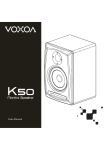
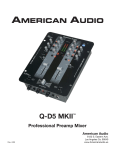
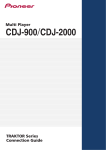
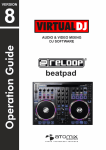
![[English] 450 KB](http://vs1.manualzilla.com/store/data/005878868_1-e5f7783ea728201c5d3bf440f5f55954-150x150.png)
